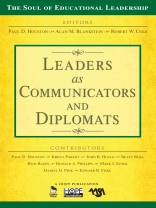Motivate, persuade, and inspire your school community!
A central role of any educational leader is that of an accomplished communicator—one who can relate to diverse communities, promote cooperative interaction, and unify stakeholders around the larger cause of quality education for every student.
This sixth volume in the Soul of Educational Leadership series provides innovative ideas on diplomacy and practical strategies for strengthening communications skills. With contributions from top leadership figures like Paul D. Houston, John R. Hoyle, Rich Bagin, and Daniel H. Pink, this resource emphasizes the importance of clear and purposeful communication in gaining support, avoiding misunderstandings, and establishing productive communitywide relationships. Individual chapters demonstrate how readers can:
- Create dynamic, effective districtwide communication systems
- Respond to district challenges and issues
- Use electronic communication tools effectively
- Secure and increase funding for their schools and districts
- Increase avenues for informing the public about issues that affect schools and students
This insightful book offers all school leaders a rich array of creative, thoughtful communication approaches to empower their leadership and inspire everyone who has a stake in preparing today′s students for tomorrow′s challenges.
विषयसूची
Preface – Robert W. Cole
Acknowledgments
About the Authors
1. The Superintendent as Communicator and Diplomat – Paul D. Houston
2. The Leader as Communicator and Diplomat – Krista Parent
3. The Educational Leader: Diplomat and Communicator for All Students – John R. Hoyle
4. Learning to Be a Leader – Betty Rosa
5. Leaders as Communicators and Ambassadors – Rich Bagin
6. The Superintendent as Key Communicator and Diplomat: A Case Study – Donald A. Phillips
7. The Superintendent as Blogger – Mark Stock
8. A Whole New Mind for Schools – Daniel H. Pink
9. Endnote – Edward B. Fiske
Index
लेखक के बारे में
Robert W. Cole is proprietor and founder of Edu-Data, a firm specializing in writing, research, and publication services. He was a member of the staff of Phi Delta Kappan magazine for 14 years: assistant editor 1974-1976, managing editor 1976-1980, and editor-in-chief 1981-88. During his tenure as editor-in-chief, the Kappan earned more than 40 Distinguished Achievement Awards from the Association of Educational Publishers, three of them for his editorials. Since leaving the Kappan, Cole has served as founding vice president of the Schlechty Center for Leadership in School Reform (1990-1994). At CLSR he managed districtwide and communitywide school reform efforts and led the team that created the Kentucky Superintendents’ Leadership Institute. He formed the Bluegrass Leadership Network, in which superintendents worked together to use current leadership concepts to solve reform-oriented management and leadership problems.As senior consultant to the National Reading Styles Institute (1994-2005), Cole served as editor and lead writer of the Power Reading Program. He and a team of writers and illustrators created a series of hundreds of graded short stories, short novels, and comic books from Primer through Grade 10. Those stories were then recorded by Cole and Marie Carbo; they are being used by schools all across the United States to teach struggling readers.Cole has served as a book development editor for the Association for Supervision and Curriculum Development (ASCD), for Corwin Press, and for Writer’s Edge Press. He has been president of the Educational Press Association of America and member of the Ed Press Board of Directors. He has presented workshops, master classes, and lectures at universities nationwide, including Harvard University, Stanford University, Indiana University, Xavier University, Boise State University, and the University of Southern Maine. He has served as a special consultant to college and university deans in working with faculties on writing for professional publication. Recently he began serving as managing editor and senior associate with the Center for Empowered Leadership.












